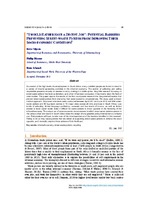| dc.contributor.author | Viljoen, Kotie | |
| dc.contributor.author | Blaauw, Phillip | |
| dc.contributor.author | Schenck, Rinie | |
| dc.date.accessioned | 2018-05-09T13:39:45Z | |
| dc.date.available | 2018-05-09T13:39:45Z | |
| dc.date.issued | 2016 | |
| dc.identifier.citation | Viljoen, K. et al. (2016). “I would rather have a decent job”: Potential barriers preventing street-waste pickers from improving their socio-economic conditions. South African Journal of Economic and Management Sciences, 19(2): 175 - 191 | en_US |
| dc.identifier.issn | 1015-8812 | |
| dc.identifier.uri | http://dx.doi.org/10.17159/2222-3436/2016/v19n2a2 | |
| dc.identifier.uri | http://hdl.handle.net/10566/3649 | |
| dc.description.abstract | As a result of the high levels of unemployment in South Africa, many unskilled people are forced to resort to
a variety of income-generating activities in the informal economy. The activity of collecting and selling
recyclables presents virtually no barriers to entry, making it a viable option. Very little research focusing on
street-waste pickers has been undertaken, and, when it has been conducted, it has mostly taken the form of
case studies. This paper reports the results of the first countrywide research into the potential barriers that
prevent street-waste pickers from improving their socio-economic circumstances. The study used a mixedmethod
approach. Structured interviews were conducted between April 2011 and June 2012 with 914 streetwaste
pickers and 69 buy-back centres in 13 major cities across all nine provinces in South Africa. Low
levels of schooling, limited language proficiency, uncertain and low levels of income, as well as limited
access to basic social needs make it difficult for waste pickers to move upwards in the hierarchy of the
informal economy. The unique set of socio-economic circumstances in which street-waste pickers operate in
the various cities and towns in South Africa make the design of any possible policy interventions a complex
one. Policymakers will have to take note of the interdependence of the barriers identified in this research.
Failing to do so may cause policies that are aimed at supporting street-waste pickers to achieve the exact
opposite, and, ironically, deprive these pickers of their livelihood. | en_US |
| dc.language.iso | en | en_US |
| dc.publisher | AOSIS | en_US |
| dc.rights | This is an open access journal which means that all content is freely available without charge to the user or his/her institution. Users are allowed to read, download, copy, distribute, print, search, or link to the full texts of the articles, or use them for any other lawful purpose, without asking prior permission from the publisher or the author. This is in accordance with the Budapest Open Access Initiative (BOAI) definition of open access. Learn more about the journal copyright, licensing and publishing rights. | |
| dc.subject | Informal economy | en_US |
| dc.subject | Street-waste pickers | en_US |
| dc.subject | Recycling | en_US |
| dc.title | “I would rather have a decent job”: Potential barriers preventing street-waste pickers from improving their socio-economic conditions | en_US |
| dc.type | Article | en_US |
| dc.privacy.showsubmitter | FALSE | |
| dc.status.ispeerreviewed | TRUE | |
| dc.description.accreditation | DHET | |

